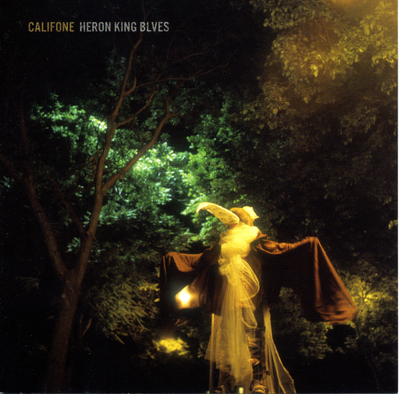
Heron King Blues
Califone's Heron King Blues came fresh on the heels of 2003's critically acclaimed Quicksand/Cradlesnakes. Heron King Blues picks up where Q/C left off, and was again recorded in Chicago at the band's Clava Studios. This time around the band recorded with Michael Krassner (Boxhead Ensemble, Simon Joyner, Edith Frost), and are led by longtime collaborators Tim Rutili and Ben Massarella, along with Jim Becker and Joe Adamik.
For this recording the band set out to make a record like Captain Beefheart's Mirror Man, entering the studio with a blank canvas and laying things down quickly. The resulting songs combine the bands more pop-oriented qualities alongside their more spaced out ethereal thoughts; these most often found on their Deceleration releases available on the bands own label, Perishable. The resulting sessions led to songs that were improvised or written immediately before recording, and within days a series of raw, live recordings had been completed. From there the initial recordings were chopped up, mixed around, and reassembled into the final product: a beautifully lush and patient masterpiece.
While the approach to recording Heron King Blues may have seen its inspiration come from Captain Beefheart, the records topical and musical make up was inspired from Tim Rutili's recurring dream featuring a giant half-man/half-bird character. Rutili was startled to learn recently that the very character he imagined did indeed exist and was named Heron King. The perhaps real, perhaps fictional character was used by the Romans to defeat the British in ancient times. If you think we're kidding about this stuff, the joke is on you, just listen to the record.
The Heron King and aviary themes are omnipresent through the record with Rutili making frequent mention and reference to the king's legend. He also manages to cull mood and tone from his own personal experience with the "bird man," going so far as to feature on the album's cover "an entirely accurate portrayal" of the Heron King of his dreams. Heron King Blues brings together "numerology, bird references, wartime tension, filthy rock and tender mercy" to form what is Califone's most mysterious record to date. One that Rutili himself concludes as: "pretty dark and very natural; it's us."